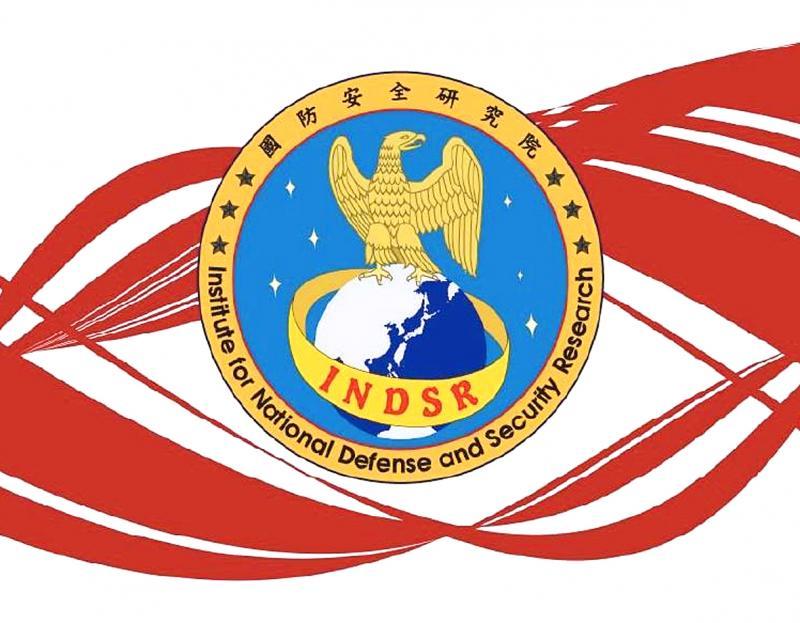The Institute for National Defense and Security Research is expanding its ties with think tanks in Europe, and they are interested in Taiwan’s experience in countering China’s security threats, a source familiar with the matter said yesterday.
Since its establishment in May 2018 by the Ministry of National Defense, the institute has interacted with think tanks or research agencies in the US, New Zealand, Australia, India, Japan, South Korea and Europe, its budget plans over the past few years showed.
Many European nations have been alerted to China’s “wolf warrior” diplomacy, military expansionism and its ties with Russia, which is an opportunity for the institute to acquire more partners through “think tank diplomacy,” an institute member said on condition of anonymity.

Photo: Aaron Tu, Taipei Times
The institute has twice led delegations to participate in the annual Berlin Security Conference, the member said.
The conference is “a window of opportunity” for the institute to expand its military interactions with European nations, it wrote in its budget plan for 2019, adding that it was attended by high-ranking military officers from Germany and Italy, but none from China.
However, as formal military interactions between Taiwan and Europe are impossible at this time, the institute’s priorities are to build up communication channels and mutual trust with its European counterparts, the member said.
Several European nations have expressed an interest in learning from Taiwan’s experience in countering disinformation campaigns and cognitive warfare by Beijing, the member added.
The institute had planned to visit the Finland-based European Centre of Excellence for Countering Hybrid Threats — established in 2017 by members from the US, the UK and Germany among others — as well as other research agencies in Estonia, Sweden and Denmark, its budget plan for last fiscal year showed.
While those plans were shelved due to the COVID-19 pandemic, there are many potential partners for the institute in the Baltic and northern Europe, as their situation is similar to that of Taiwan, having to confront threats posed by Russia, the member said.
When it comes to countering Beijing’s verbal and military intimidation, Taiwan is the most experienced nation, Democratic Progressive Party (DPP) Legislator Chao Tien-lin (趙天麟) said, adding that the institute could share Taiwan’s experience with its European partners.
The institute is Taiwan’s only official think tank, so it should continue to reach out to partners in the UK, France, Germany and Spain at a time when the EU and NATO are expanding their participation in the Indo-Pacific region, DPP Legislator Wang Ting-yu (王定宇) said.
Interactions with think tanks in Japan, Australia and India should continue, as these nations are also playing increasingly significant roles in the region, he said.
European nations had been less involved in the Indo-Pacific region, but that has changed, National Taiwan University Department of Political Science associate professor Chen Shih-min (陳世民) said.
“With China promoting ‘wolf warrior’ diplomacy and becoming more aggressive toward Taiwan and in the Indo-Pacific region, cross-strait issues have become a flash point of international security affairs,” Chen said. “European nations that maintain close ties with Washington cannot be indifferent to the situation.”

TRUST: The KMT said it respected the US’ timing and considerations, and hoped it would continue to honor its commitments to helping Taiwan bolster its defenses and deterrence US President Donald Trump is delaying a multibillion-dollar arms sale to Taiwan to ensure his visit to Beijing is successful, a New York Times report said. The weapons sales package has stalled in the US Department of State, the report said, citing US officials it did not identify. The White House has told agencies not to push forward ahead of Trump’s meeting with Chinese President Xi Jinping (習近平), it said. The two last month held a phone call to discuss trade and geopolitical flashpoints ahead of the summit. Xi raised the Taiwan issue and urged the US to handle arms sales to

A magnitude 5.6 earthquake struck off the coast of Yilan County at 12:37pm today, with clear shaking felt across much of northern Taiwan. There were no immediate reports of damage. The epicenter of the quake was 16.9km east-southeast of Yilan County Hall offshore at a depth of 66.8km, Central Weather Administration (CWA) data showed. The maximum intensity registered at a 4 in Yilan County’s Nanao Township (南澳) on Taiwan’s seven-tier scale. Other parts of Yilan, as well as certain areas of Hualien County, Taipei, New Taipei City, Taoyuan, Hsinchu County, Taichung and Miaoli County, recorded intensities of 3. Residents of Yilan County and Taipei received

Taiwan has secured another breakthrough in fruit exports, with jujubes, dragon fruit and lychees approved for shipment to the EU, the Ministry of Agriculture said yesterday. The Animal and Plant Health Inspection Agency on Thursday received formal notification of the approval from the EU, the ministry said, adding that the decision was expected to expand Taiwanese fruit producers’ access to high-end European markets. Taiwan exported 126 tonnes of lychees last year, valued at US$1.48 million, with Japan accounting for 102 tonnes. Other export destinations included New Zealand, Hong Kong, the US and Australia, ministry data showed. Jujube exports totaled 103 tonnes, valued at

BIG SPENDERS: Foreign investors bought the most Taiwan equities since 2005, signaling confidence that an AI boom would continue to benefit chipmakers Taiwan Semiconductor Manufacturing Co’s (TSMC, 台積電) market capitalization swelled to US$2 trillion for the first time following a 4.25 percent rally in its American depositary receipts (ADR) overnight, putting the world’s biggest contract chipmaker sixth on the list of the world’s biggest companies by market capitalization, just behind Amazon.com Inc. The site CompaniesMarketcap.com ranked TSMC ahead of Saudi Aramco and Meta Platforms Inc. The Taiwanese company’s ADRs on Tuesday surged to US$385.75 on the New York Stock Exchange, as strong demand for artificial intelligence (AI) applications led to chip supply constraints and boost revenue growth to record-breaking levels. Each TSMC ADR represents